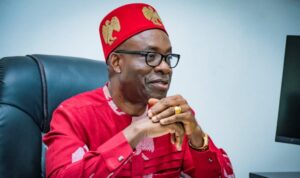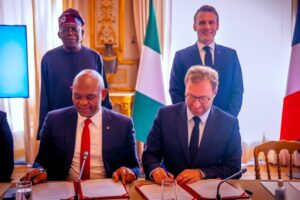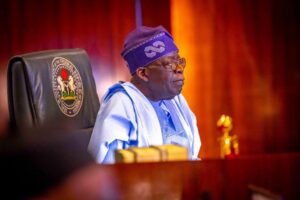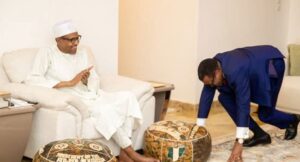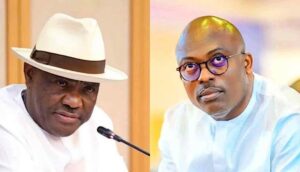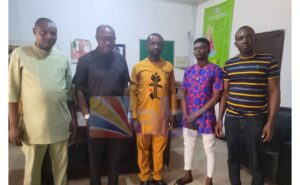PRESS RELEASE!!!NEW GOVERNANCE MODEL FOR NIGERIA
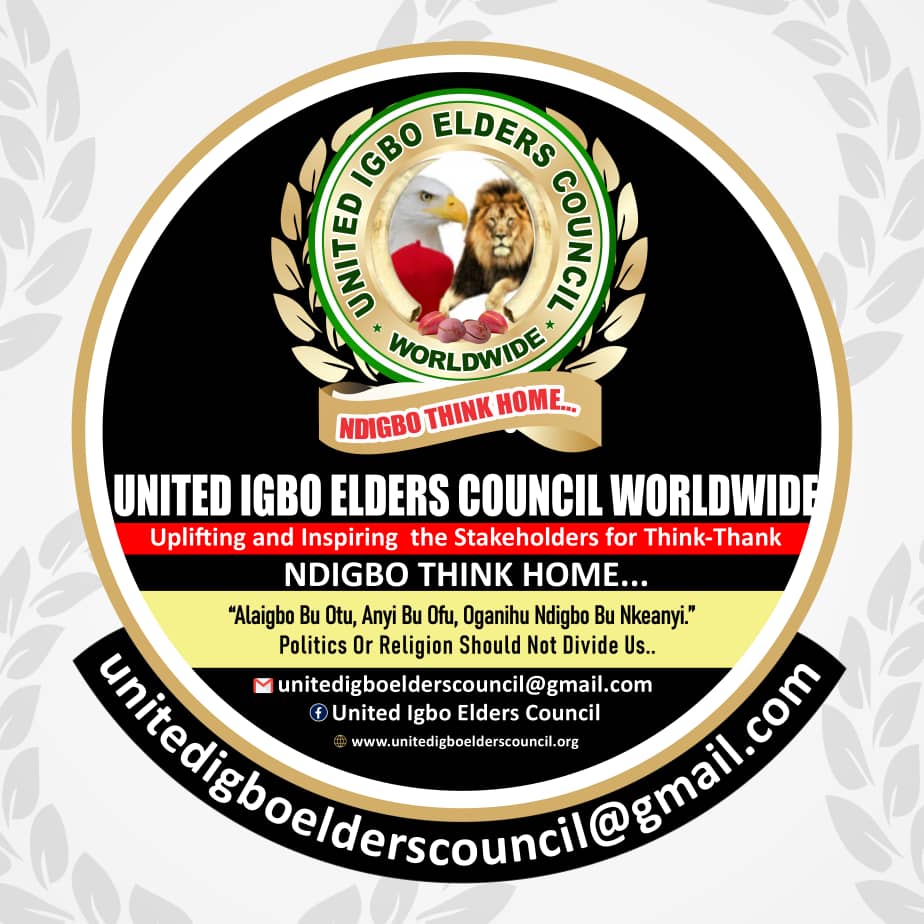
Position of the United Igbo Elders Council Worldwide on RESTRUCTURING, REGIONALISM, and REFERENDUM
~ A win-win template for peace and stability in Nigeria.
At an Emergency Meeting over a “New Governance Model” for Nigeria, otherwise called Restructuring, and occasioned by sundry enquiries concerning the position of Ndigbo on the burning question, the United Igbo Elders Council Worldwide, Igbo Elders from all the North Central, South East, South South “Zones” and states of Igbo major or minor indigeneity, including Igbo Elders in the Diaspora, decided to adopt and present to fellow Nigerians the following positions:
I. THE TRENDING MISCELLANY OF PROPOSALS – DR. AKIN FAPOHUNDA AS POINT OF REFERENCE.
Preamble
The Igbo and many other Easterners once again appreciate the distinguished President Bola Ahmed Tinubu, for the gradual improvements in security in the East, due to the apparent discontinuation of the Unknown Gunmen policy, “farmers-herders clashes,” terrorist kidnappings and farm seizures, what appears to be a phoney “war” to decimate the Eastern economy and populations in guise of fighting a largely orchestrated “insurgency,” and other violent policies undertaken by his predecessor destroying the Igbo/Eastern and other peoples of Nigeria in wild pursuit of ethnoreligious objectives widely condemned by Obasanjo, Danjuma and many other Nigerians.
We humbly remind Mr. President that there still appears to be groups or individuals in official and non-official circles that are not comfortable with any peace Eastwards, circles nostalgic of the eight years of free mayhem, and bent on continuing from where they were stopped mid-2023, to export disaster to the Region on any pretexts. Many Nigerians hosting them know that the Igbo are a very peace-loving trading people, and had at no time since 1970 declared war on the federal government, although it is well-known that not every Igbo child had been comfortable with armed terrorists invading and destroying farms, seizing the highways and footpaths, kidnapping and killing their parents and other innocent citizens sometimes even after collecting ransoms, managing to enlist some unemployed and hungry Igbo youths into their ranks, and with none of them since mid-2015, ever brought to justice when by “mistake” they get arrested.
In one of countless other occasions the terrorists, with N100, 000, 000.00 ransom already pocketed, had to boast to a captured Archbishop Kanu Uche and his humiliated colleagues that they had come to forcefully settle in Igboland and that any community that dares oppose them would receive the full wrath of “the armed forces.”
The Igbo, largely a trading community, have never lifted a sword against any Nigerians, and would not in the future do so, but, particularly since mid-2015 have witnessed war, bloodshed and mayhem systematically brought to their doorsteps, farms and highways, with hardly anyone having an effective answer to the calamity. Hence the cheering regard by us in the APC of His Excellency President Ahmed Tinubu’s emergence as a saving grace, at least because he comes from a group that values life and progress, with whom the Igbo can partner to correct whatever mistakes made by Zik, Awo, and others. No one knows tomorrow; so, let not the Yoruba, Igbo and other Nigerians continue to bemoan anything, and miss this golden opportunity to correct any mistakes of the past, and reset Nigeria upon new civilizational foundations. The unconditional and immediate release of Mazi Nnamdi Kanu and his colleagues would go a long way not only in cementing this perspective, but also eliminating one of the several pretexts for insecurity in the East.
Since his seminal Path to Nigerian freedom (1947), the sage, Baba Obafemi Awolowo and other great Yoruba compatriots, have been in the forefront of the advocacy for the restructuring of Nigeria on ethno-linguistic and related cultural principles. It is therefore no surprise that it is from our Yoruba brothers that the discourse has this 2024 acquired a new momentum under a Yoruba-led Presidency of Nigeria. If the restructuring is undertaken with a genuine honesty of purpose for a nation-building that benefits everybody, there could be no worthier legacy for our President and party. Hence, almost every group has joined the moving train, each one making their positions known, in the hope that a truly new and just Nigeria is in the offing for the benefit of everybody.
This Igbo response on restructuring proceeds from the trending CONSTITUTION OF THE FEDERAL REPUBLIC OF NIGERIA. NEW GOVERNANCE MODEL FOR NIGERIA ACT 2024. ANNEXURE TO DECREE 24 OF 1999, drafted by Dr. Akin Fapohunda which, though suggested by many as mere kite-flying to test waters and divert attention from other matters, is already rumoured as attracting official support, and with little or no proper examination, being allegedly due, post haste, for consideration by both Houses of Parliament.
Other proposals are being brought out, but, unfortunately, almost none of them so far has paid any regard to either the legitimate interests of the Igbo, nor the interests of other Nigerians suffering under deliberately man-made arrangements. This advert therefore is in part for those who desire to know those interests that affect each and every Nigerian, awaiting redress in a true restructuring.
“Igbo Problems With Their Neighbours.”
Nothing is as sweet to the ears of some peoples than that the Igbo and their neighbours are “bitter enemies,” when indeed it is they that are bitterest enemies to their own neighbours. Name one Nigerian ethnic group that is not a “bitter enemy” to their neighbours!
The Igbo-neighbour “enmity” is the self-chosen false weltanschauung from which many build their castles in the air divide-and-rule misgovernance of Nigeria, including on restructuring. And, this enables its propagators to separate the Annang-Efik-main Ibibio, Bini, Ekoi, Idoma, Igala, Ijaw, Ishan, Isoko, Itsekiri, Ogojas, Ogoni, Urhobo, and others from their almost harmless Igbo near kith and kin; to seize the oil and other resources of these “helpless” peoples; to destroy their environments and continually impoverish their communities; to militarily occupy and victimize their unhappy peoples; to render their port cities, forests, vast lands in the Middle Belt, rivers and coastal ports redundant instead of modernizing and preparing them for the AfCFTA; to encourage them to lay falsified claims on Igbo coastal ports, lands and properties as “abandoned” and, therefore, reward for playing the game of Igbophobist ethnic-cleansing, Igbo dismemberments and “landlocking;” to incite that their survival lies in an Igbo and their own destructions, their prosperity in their impoverishment, and their security in orchestrated insecurity; all to ensure an everlasting disharmony, enmity and volatility East, South and Middle Belt of Nigeria.
Particularly since 1967, this “Igbo problem with their neighbours” has become an industry determining the prosperity, rise and rise of sundry individuals, while their masses suffer in unhygienic life, hunger and penury. They talk condescendingly on these ethnic groups, pretending to be re-educating highly educated groups on who they ought to be; inducing or encouraging Igbo communities of the “advantage” of rather being miniature and weak “independent” ethnic nationalities or “Igboids,” and so on, than parts of a larger and stronger Igbo nation, while assembling their own hardly mutually intelligible units into a single whole. Plus many other insulting lexicons or policies necessary at any point against these “minorities.”
Let it be declared umpteenth time to the world that the Igbo have no problem with any neighbours, except a choice refrain ever since destroying these good brothers and sisters. Unlike elsewhere the Igbo never at any time targeted neighbours for eradication, at no time exploited their resources that never existed in the first place until a 1961 to 1965 spread oil trinkles after thousands of years of relationships. The Igbo were all along actually using Igbo resources to accommodate all, because we are all one. But, till today the Igbo are deprived of the reciprocity from a great oil wealth that was in vain pleaded to help develop any part of Igbo society. This lack of reciprocity the Igbo blame not on neighbours, since they too are in no control of what was freely given them by God, and rightly theirs.
The Igbo substantially built America with the forced export of manpower, and powered the British and part-European industrial revolutions with palm oil and kernels, coal, antiquities and foods exports mainly through their own coastal ports of Igweocha, Ubani, and Opobo. The UNN was built with a combined AkwaCross, Obolo, Ogoni, Igbo, Ijaw, and West Cameroonian resources, and till date reflected in their elements.
The Igbo are happy with the great wealth embedded beneath and above their neighbours, but, unfortunately realize that only through the swords of disharmony sown between the Igbo and others do some people imagine they can endlessly be snatching these resources instead of the peace and justice that the Igbo offer.
Therefore, the first choice for the Igbo in any restructuring remains an enlarged Eastern unity up to the great Benin Empire/Edo state, and embracing the Bassa, Idoma, and Igala, all on mutually agreed terms. The Igbo bear no grudges, regard whatever happened from 3rd parties as lesson for a better future, value the help and assistance extended by many families in dire moments, and believe that restructuring offers an opportunity for laying the foundations for a return in modern times to the mutualities of yore. Hence, despite the seeds of evil already sown and the “benefits” accruing thereof, this offer for extended regional unity is on the table, for each group to decide what to do.
Major Flaws in the Fapohunda (and related) New Governance Models.
1.Except some concessions extended to the caliphate, only the concerns of our good Yoruba/Western compatriots for Yoruba unity and homogeneity were adequately taken care of by brother Fapohunda and some others, while treating other areas with what may amount to cavalierly or casual concerns; this is a foreboding for many Nigerians, suggesting that no genuine restructuring except mystifying the status quo is intended.
2.The draft instead of treating the Hausa as deserving rightful region in their own homeland, reinforced their subjugation under an anachronistic Fulani caliphate. Any new governance model or restructuring in the North would be a “we don’t care” exercise in deceit if it does not provide for the liberation of the Hausa in their own homeland, and the freedom of both they, and the presumably freedom and peace-loving Fulani and other Northerners, from the caliphate/emirate system. That means the final proscription of the caliphate system, and either a consensual creation of a Fulani homeland besides the Hausa to encourage the former’s full transition from primitive wandering to civilized settled bands, or their immersion within a prospective Hausa democratic majority rule. It appears the draft operated only within a certain level of narrow conceptualization of governance model or of restructuring outside this felt need. Let it be made clear from the onset that the Igbo love the Fulani exceedingly as they do other Nigerians, but, believe we should join other civilized nations of the world and put the caliphate system into the archives of history, governed under a common legal system, and start living together as brothers and sisters with no special or hereditary privileges dividing the citizens.
3.But, a supposed 21st century draft on nation-building additionally went on to strengthen the hands of the primitive caliphate over the entire Middle Belt, parts of which have alien entities called emirs imposed on them from Sokoto, and others still in the throes of a jihadist invasion violently expelling surviving indigenous peoples into hopeless IDPs camps. Call it new governance model or restructuring, it has almost nothing positive for that widely contested territory where people are not sure who owns which lands, who next would be violently expelled, to where, and as long as when. The matter of individual freedoms and republican attitudes to life are very dear to the Igbo, from family to society, and it is obvious that other Nigerians equally hold these values very high. The draft enjoins Nigerians to march backwards instead of forwards, and to replace an awkward ancient-in-modern system with more ancientism.
4.On the surface, the draft appeared to favour elements of the Southern tribes whose “unity” lies not in fairer federal treatment or even contiguity, but in extracting Rivers, Anioma and other Igbo away from the rest of their kind to achieve an artificial “contiguity” through Igbo balkanizations, and in pursuit of the idea of “landlocking the Igbo.” Otherwise, there is no other logical reason in selectively abandoning the principle of linguistic affinity, just in order to isolate some people (Igbo) who speak the same language and distribute them into domains harbouring doubtful brotherly interests. Therefore, except to continue a presumed “plea” to help checkmate the Igbo, and the impoverishing divide-and-rule designs against the Southern “minorities,” there is absolutely nothing else special in the draft favourable either to the AkwaCross, Andony/Obollo, Bassa, Bini/Edo, Idoma, Igala, Ijaw, Ishan, Isoko, Itsekiri, Ogoni, Urhobo, each of which civilizational units would probably prefer to decide with whom to affiliate or merge in a restructured new Nigeria.
5.Whereas the concept of regions and new governance models gives the impression of restructuring, the instrumentation of National Assembly instead of Independent, Sovereign, or other Conferences in its realization, conveys a contrary idea of devolution of powers, which reconfiguration of the exclusive, concurrent and residual lists can be accomplished by mere legislation or executive orders, without recourse to any extra-constitutional “acts of necessity.” Not that theoretically a National Assembly cannot restructure a polity, but that the present one as constituted might not fairly do so.
6.The proposed 55 Provinces or States without meaningful relationship to resource generation and utilization, distorts the essence of the irrational LGAs, and runs counter to the grain of political thought and administrative experience in today’s Nigeria, in which a reduction in the costs of governance and bureaucracy dominates centre-stage.
7.The draft and many others like it did not seem to have studied such forebears as Olaudah Equiano, Dr. Africanus Beale Horton, Obafemi Awolowo, Nnamdi Azikiwe, etc on their ideas on nation-building, including the recommendations of the Willink’s Commission of 1957/58, which was widely acknowledged as an impartial document, and ever since in various depositories that laid to rest many inter-tribal territorial issues to enable a multi-ethnic independent Nigeria live peacefully afterwards.
Lift the Economic Blockade Against the Igbo/East, Subsisting Till Today Since 1967, by Modernizing and Reopening The Igbo/Eastern Coastal Ports to Make Restructuring an Honest Exercise – This is the Vital Issue Scoffed by Many
8.This continuing blockade is at the heart of the extreme poverty and de-industrialization in Igboland/East. As sadly expected, the draft was at its lowest ebb concerning the Igbo, some circles’ apparently usual scapegoats on Nigeria’s affairs, once again with no atom of “mercy” conceded. One example: while it rightly brought together all Yoruba-speaking peoples, including in Kogi and Kwara states into an “Oduduwa Region or Western Nigeria,” going East, it conveniently distributed Igbo speakers into 4 Regions (“Western Middle Belt Region,” “Southeast Region,” “South-South Region or Niger Delta Region,” and “Midwest Region or Bendel Region”). One other “proposal” could permit Aniocha Igbo join the rest, but not Rivers Igbo. Restructuring or “new governance model” ought not be designed to continue the cruel economic blockade denying the Igbo their coastal ports, but should be a true nation-building opportunity to start treating everyone alike as part of the common fold of Nigeria. Restructuring or “new governance model” should address obvious injustices and anomalies impeding true unity, peace and development of Nigeria, and not a design to create new problems or make existing ones worse. But, this Igbo and like-minded position seems not to matter to some proposals on restructuring.
The world and European explorers knew that it was basically through the Igbo-founded and developed coastal ports of Igweocha/P.H., Ubani/Bonny, Opobo, that the Igbo were for centuries coerced into exporting millions of their kind to the Western hemisphere; afterwards foods, antiquities, palm oil and kernels, coal and crude oil trades; and to ensure peace among Nigerians the British even went an extra mile to specify the Igbo contiguity to the coast, emphasizing in part that the Ogoni are divided from the Ijaw “by a broad arm of the sea which runs up to Port Harcourt, and by a long stretch of Ibo territory which culminates in this town” (Willink’s, page 51). Copious records equally exist concerning preordination, development and utilization of the Azumini-Opobo Imo River basin.
The Igbo are content with what God gave them; covet nobody’s lands or possessions and have no need to do so, and only seek a live-and-let-live mutual respect and consideration. Many Igbo, civil and military, fought on the federal side during the civil war, and did not demand retribution against any non-Igbo for fighting on the Biafran side, and those great Igbo federalists deserve respect. In return it would not be fair for anyone to endlessly go on requiring that parts of Igbo society or any other thing Igbo continue as unspoken “booty” or “reward” for presumably fighting on same federal side, same way that some Igbo equally did.
All fellow Nigerians should be further reminded that the endemic poverty in the Middle Belt, part Northcentral, down to Maiduguri/Bama is a direct spillover of the closure of the Igbo and other Eastern ports since the 1967 economic blockade that subsists till today, and diversion to Lagos ports for almost everything; that the key to the optimal development of the eastern half of the country from coast to Benue River to Lake Chad lies more with the direct East than the longer-routed circumnavigational West; and that acquiescing to the continuing blockade and emasculation of the Igbo has an incalculable deleterious effect upon the entire eastern half of the country.
Therefore, end the economic blockade against the Igbo and by extension the entire eastern half of Nigeria, modernize and reopen the Igbo/Eastern ports to recreate a new pole of dynamic development in the East, reflect this in any restructuring or “new governance” modelling, so that not only the unfavoured eastern, but also the favoured western halves of the country would explode in mutually emulating progress up to the sahel. By reducing the gridlocks and other overhead costs around Lagos, the Yoruba/Westerners themselves, the Rivers Igbo and other Easterners and Southerners would be the first beneficiaries of modernizing and reactivating the Igbo/Eastern ports, ever before the advantages spill over into the Igbo hinterland, Middle Belt, down to Lake Chad.
In a nutshell, the Dr. Akin Fapohunda draft and others like it neither appreciated Igbo unity nor Igbo contiguity to the coast, the same coherence, contiguity and cultural similitudes justly acknowledged for our Yoruba compatriots, thus knowingly or unknowingly repeating Nigeria’s bane of applying different measures to similar cases, and consigning into guesswork the motive of the “new” governance model or “restructuring” draft. The Igbo and others see restructuring as a means of enhancing the potentials of everybody, not expanding them for some and limiting them for others; and, this restructuring offers an opportunity to dot the i’s and cross the t’s in missed opportunities of handshakes across the Niger and Benue Rivers.
9.The draft appears to be further proof of continuation of the awkward and vindictive tradition of a South-South Geopolitical Zone, now in a “new” form of South-South Region (alias “Niger Delta Region”), whose “contiguity” derives from forcing the Rivers Igbo into it, breaching the Igbo contiguity to the coast and, in effect, a mere elaboration into Eight Regions of the Six Geopolitical Zones, priorly prohibited by the 2014 Conference as basis for restructuring.
10.It is still not very clear to Nigerians whether the draft found its way into the National Assembly as an executive bill commissioned through our good Dr. Akin Fapohunda, a parliamentary bill, or private member’s bill and, if the latter, why such an alarmingly rapid interest in it by our Presidency.
We, nevertheless, appreciate the enormous learning exhibited by our distinguished compatriot and whoever else partnered with him in compiling the draft, as well as other proposals, for even having the courage to tackle the complex task of restructuring or “new governance model” for Nigeria.
Other Comments on the 8-Region Proposal.
Part I confers on the National Assembly authority to invoke the “doctrine of necessity” to kickstart restructuring, whereas many believe that the body as constituted, one of the main beneficiaries of the system, is incapable of honest legislation to deprive themselves of the dividends of injustice and corruption. Hence the call for either an Independent National Conference (INC), Sovereign National Conference (SNC), or any other Conference that should provisionally deconstitute and manage the polity, preparatory to its reconstitution on consensual basis.
In Part III (3.2) the basis of the new “federation” is to be ethnic nationalities correctly defined in terms of people with a common culture or similar customs, mutual intelligibility of language, belief in common or related identities, inhabiting an identifiable contiguous territory, and endowed with “unconditional right to self-determination.” This is okay, except its avoidance of the issue of nationalities like the Fulani with no preordained territories, and the status of enclaves or exclaves of say, the Ijaw, whose forced contiguities beyond Burutu/Escravos and New Calabar River would impede the natural contiguities of others. It was also not clear whether the “unconditional” right of self-determination extends to absolute self-determination outside Nigeria or only restricted to relative self-determination inside the country.
Under 3.II. Establishment and Composition of the Security Services, the draft in (2) rightly hit the nail on the head in recommending the regionalization of the military. At the height of the post-2015 state-sponsored atrocities the Senate had demanded a personnel and related audit of the military and likes to account for their demographic and other constitution in all echelons of command, but suddenly balked presumably under malign pressures. The army and other security services should not appear to be acquiring the cultic attributes of the Thai military, an extremely corrupt and oppressive parallel state-within-state operating with own violent primitive laws, snatching a chunk of the national resource for unlawful private accumulation, distorting the principle of civil superordinacy over military, and fighting more against the people than in defence of territorial integrity, in guise of protecting a monarchy. Therefore, the draft’s recommendation of no more than 10% of the officer corps coming from other regions is a logical step to regain confidence in the military-security services, promote security, peace and unity, and end the suspicion of all manner of manipulations being used to compromise the services into captured instruments of sectional vendetta. Added to this would be a long overdue deconcentration of military-security infrastructures, and their spread across all regions of the country to avoid any undue advantage and possibilities of blackmail at dire moments.
4.1. Processes and Procedure for Transformation. This is another serious problem with the draft. So far, there is hardly any sustained lexicon on restructuring which, if not for the use of Regions, albeit with a National Assembly “act of necessity” might, though not automatically imply a devolution of powers or reshuffling of legislative lists, with less exclusive but more concurrent and residual responsibilities. If devolution is intended it does not require new regions or acts of necessity for a National Assembly to undertake legislation benefiting existing structures.
But, if 4.1. (1) “New Governance Model for Nigeria” is a euphemism for restructuring, especially given the Part III 3.2 emphasis on ethnic nationalities, the 4.1 reversion to the 2014 Constitutional Conference that rejected the Six Geopolitical Zones as basis for restructuring, translates into a significant negation of both the New Governance Model and of restructuring per se. Once anyone reverts to the previously rejected Six Geopolitical Zones, that would amount to an inexplicable insistence on old mistakes, present problems and antagonisms, and zero solutions in the guise of new solutions.
We had earlier observed that in the “new governance model” regions, there was no provision for an emancipated Hausa and emancipated Fulani regions, or, should a restructured new Nigeria continue the destructuring of the Hausa into Fulani slaves in perpetuity, and the Fulani hoi polloi continue their subjection into a violent combatant arm against other tribes by the Fulani caliphate and literati in the name of ethnic solidarity? Can this old wine in a new bottle be properly called “new governance model”?
A restructuring or new governance model must return the Middle Belt into a region of peace, governed by themselves and not by alien emirs or village heads imposed from elsewhere; a federally sponsored return to their aboriginal lands of those violently expelled by sundry jihadist land grabbers; and a multimodal re-linkage with the Igbo and others in the South for mutually reinforcing protection, development and prosperity.
The Bini would not wish to abandon their civilization; the Ijaw had long been demanding a contiguous Ijaw homeland; the Ogoni may still be conscious of Ogoni self-determination; the Jukun, Tiv and others unfairly scattered in conflicting administrative domains might each desire a territorial homogeny for a better organized and coherent development. The Nupe are not likely to prefer a continued subjection to a Fulani emir, supplanting an originally defined Nupe culture; nor might the various Northern indigenous communities so affected wish to continue with local colonial emirs and “village heads” planted over them via Sokoto; or the Efik/Ibibio/Annang and other AkwaCross peoples denied their well-developed civilizations that predated colonialism and Amalgamation. In the same vein there is no reason for the Kanuri through whom peaceful sunni islam entered Nigeria not to be re-accorded the pride of place in the country’s democratized islamic leadership, which preordination was a factor in the relative peace in the North before dan Fodio’s entry.
The Igbo of themselves abolished the Osu system, the Yoruba Aboriginal Ogboni, the Efik-Ibibio bloody Ekpe initiations; the Tiv have denied allegations of wife-lending . . . All ethnic nationalities are abandoning any survivals of primitivism, and our Fulani brothers and sisters can equally afford to abandon the caliphate system subjugating any Nigerians. If a “new governance model” will address none of these vital issues what else is it about or novel in it? All Nigerian ethnic nationalities have been conscientized and wizened by the violence and injustices orchestrated against them; whatever happens, each demands a voice on the future of the country.
On Internal Restructuring and Inter-Ethnic/Regional Mergers.
The Igbo republican tradition appreciates that internal freedom and diversity from child to family to society are a source of strength, same way that though “tribe and tongue” may differ, they nevertheless constitute a potential source of power, unity and prosperity in Nigeria. To translate these diversities into advantage, all that is required is for each Region, whether homogenous or multi-ethnic, to have its own internal restructuring expressed in a Regional constitution to address its domestic issues, either before or after the national restructuring. Related to this is what seems like another creative approach by some of our Western brothers, maybe as an offshoot of the New Governance Model, of incorporating the Bini/Edo, Ishan, Isoko, Itsekiri, Urhobo, and even the non-Yoruba speaking parts of Kogi and Kwara states into a wider Yoruba fold or new Western Region, offering each one the choice to object.
That is excellent because the more diverse the merrier within a region. However, the Igbo approach here is for a voluntary pre-merger decision to unite, than an uncertain post-merger offer to opt out, to be applied nationwide, including for ethnic nationalities from the Niger-Benue confluence to the coast.
II. IGBO and RESTRUCTURING
Like many other Nigerians most Igbo progressives are keenly aware that nothing may at this point rescue the country and put it on the right track than a total and comprehensive ideologically driven socioeconomic and political revolution. But, with guns recklessly pointed at all azimuths by the exploiting classes, and divide-and-rule ethnoreligious manipulations to complement, the progressive elites and masses deny themselves the organizational capacity for this historical necessity. Therefore the only other means of peacefully liberating the country and people is a form of restructuring able to grant to each group a reasonable capacity for the full expression of their individual and collective potentials. Peoples have been oppressed beyond measure and now divided into four broad categories:
~ Nationalities or groups of nationalities seeking independent statehood outside Nigeria, preferably through a UN-conducted referendum. At the forefront of this absolute or external self-determination are those Igbo and allies for Biafra; those for a Yoruba nation or Oduduwa Republic; and other nationalities mostly in the South but gradually embracing the Middle Belt contemplating the main direction of the wind before making up their minds. With no reliable blueprint, but distrustful of each other’s motives and so unable to unite for mutual assistance, none has made any headway beyond raising some consciousness.
~ The elites of some nationalities who, while acknowledging the legitimate rights to self-determination both in natural, domestic and international laws, are equally aware of the severe domestic and external limitations for their exercise, especially the susceptibility of Nigerians to a divide-and-rule transfer of animosity and vengeance, are ready to unite for an honest restructuring of the polity to grant a level of internal or relative self-determination to the various nationalities or groupings thereof to peacefully stabilize the polity.
~ The corrupt and compromised system beneficiaries of sundry characterizations who are opposed to any genuine restructuring or fundamental change, and propagating that they destroying the country are the patriots while dishonestly accusing those recommending restructuring as either seeking a confederation or disintegration of Nigeria. This group has malign linkages both within themselves and with external entities bent on the continuing destruction of Nigeria.
~ The politically nonchalant or ignorant, mostly within the poorest classes and generally unable to help themselves except mobilized to do so.
The Igbo in the second group desire nothing different from what most other Nigerians are asking for: a restructured new arrangement based on ethnic nationalities or groups thereof, with a degree of relative self-determination to unleash the potentials of every nationality as envisaged in the Akin Fapohunda draft. A fair restructuring would create conditions favourable to consensual unity without the necessity of using brute force to bludgeon everyone to “love” One Nigeria, and prove that the peoples in the space called Nigeria are not domiciled in perpetuity to evil, but capable of building a modern democratic society favourable to all her citizens.
III. IGBO and REGIONALISM.
Although good Dr. Akin Fapohunda’s “new governance model” is the point of reference here, some other proposals seem to have followed the same general line of not wanting Igbo speakers be together as a cohesive unit, and have the economic blockade against them lifted by renewing access to their coastal ports. The Igbo would like this economic blockade against them lifted as part of a true restructuring. Additionally, since colonial and Nigerian times everything has been done to selectively separate Nigerian, especially Eastern tribes into mutually antagonistic entities, but, that cruel policy has been largely unsuccessful, in part because those espousing policies of hatred have in the East had nothing to show for the seeds of divide-and-rule animosity sown to ensure unimpeded exploitation of the boundless prosperity of the East. So, this divide-and-rule policy is no longer necessary, since a peaceful formula now exists for the exploitation of the resources, nevertheless.
Given centuries-long mutually beneficial sanguinary and historical ties and advantages of the economies of scale, restoring and enlarging the original Regions is always the first choice for the Igbo in matters of restructuring the Nigerian polity, but being apprehensive of largely unsubstantiated issues of “exploitation” under the old Eastern Region, and aware of the democratic traditions of the peoples, the Igbo would prefer any prospective mergers to now be voluntary, to ensure their longevity.
Nature a Great Balancer
Nature had already structured peoples into territories, and only requires an honest political-administrative imprint for harmonious nation-building – hence, organic restructuring.
With good leadership and honesty of purpose political restructuring is neither rocket science nor reinvention of the wheel, for it has been successfully accomplished in several other countries. The general formula is for the relatively big or “special” ethnic nationalities or cultural entities like the English, Fulani, Hausa, Hindu, Igbo, Scotts, Sikhs, Yoruba, Welsh, etc to each stand alone as a uni-ethnic homogenous unit, while the rest are variously joined together into competitive multi-ethnic regions, provided that the following (Willink’s Commission report, page 47) are observed:
a. “the principle of self-determination:” the group must desire to be separate and united;
b. “the principle of ethnic relationship:” the people should be “as nearly as possible homogenous;”
c. “the principle of geographical contiguity:” the people should be indigenous within a piece of “continuous and compact piece of territory;” and
d. “the principle of viability:” the unit should constitute “a self-contained economic unit” – this enjoins relatively smaller ethnic nationalities to federate into single regions.
In the special circumstances of Nigeria, the four general principles would be supplemented by three special provisions, as follows:
e. A formal commitment, embodied in a binding resolution to seek a consensual solution to Nigeria’s problems.
f. An initial equality of regions between the original North and original South, without prejudice to the possibility of voluntary mergers on civilizational or other grounds.
g. In the South a retention of each region’s traditional contiguity to their coastal ports; and, in the North, to either the Niger or Benue Rivers – or Lake Chad.
A Choice Between 2 and 12 Regions.
Taking into account the general principles applicable to restructuring and the supplementary provisions special to Nigeria, in addition to saving the costs of governance and triggering a development revolution, Nigeria might need to choose between 2, 4, 6, 8, 10, and 12 Regions, as follows:
. . . Two regions comprising the original North and original South.
. . . Four regions comprising an adjusted Eastern and Western regions in the South; a Middle Belt and far North regions in the North.
. . . Six regions with the Igbo, Yoruba in the South each down to the coast, plus a truncated “SouthSouth” region whose contiguity has been breached by the Igbo Port Harcourt to Bonny and Azumini to Opobo contiguities to the coast; and, in the North, a Middle Belt region split longitudinally into two, plus a mostly islamic Hausa-Fulani-Kanuri region. Because of contradictions between ethnic homogeneity, contiguity, and independent coastal access in the South, and necessity of restoring a Hausa region independent of the Fulani caliphate, a just six regional structure would be nearly impossible without voluntary mergers by other Southern ethnic nationalities with the Igbo and Yoruba on one hand, and continued Hausa and Kanuri acquiescence to servitude under the Fulani, on the other.
. . . Eight regions would be expressed by an AkwaCross or original South Eastern state, an Igbo-Obollo/Andony-Ogoni federation, a Bini/Edo-Ijaw-Ishan-Isoko-Itsekiri-Urhobo federation, and a Yoruba region, all in the South; plus two Middle Belt and two far North regions on agreed terms.
. . . Ten Regions would mean five in the South: Igbo or Eastern Region; Yoruba or Western Region; AkwaCross, the original South Eastern State as Southeast Region; Obollo/Andony with Ogoni as Southern Region; and a federated Bini/Edo-Ijaw-Ishan-Isoko-Itsekiri-Urhobo as Southwest Region. In the North two Middle Belt Regions would be complemented with three separate Regions for the Hausa, Fulani, Kanuri and their various cultural affiliates. The ten Regions seem most ideal for Nigerian unity, essentially meeting all the general principles and supplementary provisions for a properly restructured polity.
. . . Twelve Regions would mean extracting the Ijaw from the Southwest federated region to constitute a Niger Delta Region contiguous between Burutu/Escravos and New Calabar River with multiple developable ports, and respecting the Bini (Ughoton, Gelegele), Itsekiri (Ogidigben, Koko, part-Warri), Urhobo (Sapele, part-Warri), Igbo (Port Harcourt, Bonny, Opobo), and AkwaCross (Ibaka/Akwa, Oron, Calabar, Bakassi, etc) contiguities to the coast. In the North a third Middle Belt would complement the separate Hausa, Fulani, and Kanuri, regions.
NIGERIANS ARE INVITED TO MORE CLOSELY EXAMINE THE FOUR-, TEN-, AND TWELVE-REGIONAL ARRANGEMENTS, except if what they want is for each of the country’s 250 to 300 or so ethno-linguistic groups to constitute her own Region. A FOUR, TEN, or TWELVE regional Nigeria should pursue a militarily non-aligned Afrocentric policy, promoting peaceful coexistence abroad as she does within.
Civilizational Preservation and Improvement
Those who speak the same language, or ethnic nationalities in Nigeria seeking to control their destiny is a part response to an existential emergency, occasioned by attempts by others to eliminate or subordinate them, and their survival promotes rather than detracts from national unity. On the other hand, identity politics is discrimination or policy based mostly on natural attributes like tribe or race beyond the victim’s control, and it stands condemned by civilized mankind. Restructuring to ensure the survival of nationalities, preserve their civilizations, and solve the national question is, therefore, not identity politics, or merely about the institutions of government, but more about the structures of governance and polity, the basis upon which the superstructures are erected.
Once a foundation is faulty the building, however lofty in other parametres and decorations would be sinking every moment until it finally collapses by its own weight. And, repositioning the kitchens, parlours and dining rooms, transferring the library upstairs to the corners below, or imposing new “rules of engagement” on life in the crumbling edifice, otherwise called devolution of powers, far from improving the solidity of a house erected on false foundations might merely hasten its collapse. Hence, regardless of the ideals of class or classless society, peoples nevertheless continue to derive meaning from the civilizations they inherited, and appreciate their recognition as units of political administration.
That was probably why Chief Awolowo, in recognition of the individuality of Nigeria’s ethnic civilizations had earlier declared that “In a . . . federation, each ethnic group, no matter how small, is entitled to the same treatment as any other ethnic group, no matter how large.” Nnamdi Azikiwe in a 1949 Aba gathering would address the uncertainties of the time thus: “The Ibo people have reached a crossroad . . . with routes leading to diverse goals, but . . . I can safely recommend . . . (the) road to self-determination . . . within the framework of a federated Nigeria and the Cameroons . . . an Ibo state, based on linguistic and ethnic factors . . . side by side with other linguistic and ethnic groups . . . each as separate as the fingers, but united with others as a part of the same hand.”
Before them, two illustrious Africans who happened to be Igbo had declared their people to the world as a nation fit for independent statehood. “From the time I left my own nation,” narrated Olaudah Equiano in the 18th century, “I always found somebody that understood me till I came to the sea coast.” Little doubt then that in the 19th another nation-builder followed, whose political struggles, writings and “philosophies became the basis for future African independence,” starting with his “Empire of the Eboes . . . between the Rivers Niger and Old Calabar, and bounded on the north by the left or Binue branch of the first river, on the south by the Atlantic, on the East by Old Calabar . . . and on the west by the River Niger” – Dr. James Africanus Beale Horton.
Yes, a reference to tribe and tongue, could be a starting point for discrimination, but that was not so for those illustrious forebears for whom they signified nations and civilizations, and might also be an acknowledgement of the positive influence of diversity in advancing progress.
It’s not possible for the United Kingdom to have achieved that global renown if the special talents of the Scots had been suppressed in condemnation of “identity politics.” Therefore, restructuring based on ethnic nationalities, where patriotically applied, far from identity politics, can be a stable civilizational approach to nation-building.
Dishonest Critics of “Identity Politics”
In light of all the foregoing, it is an affront to the sensibilities of Nigerians when the exploiters of Nigeria, the thieves and tribal tin gods, in a malign quest to reduce every moving object into a rootless mass of easy-to-manipulate and misrule entities, and obstruct the solution to the national question, begin to condemn “ethic-based regions,” equating it to identity politics or tribalism.
As if the presumed class societies they describe as models of democracy, the US and UK are not centres of identity politics: white Americans, black/African Americans, Chinese Americans, Irish Americans, American Jews, etc., and in Britain, England, Scotland, Wales, Ireland, and so forth. As if India, the largest Western democracy in the world is not built on the recognized identities of her constituent parts: hindus, sikhs, moslems, etc. As if there was no civilizational rationale in separating Pakistan and Bangladesh from India; and as if the respect accorded to ethnic, religious and racial identities makes the countries above less civilized or democratic. As if the Russian Federation is not a federation of ethnic and other identities.
As if a pretended aversion to identity politics equates to patriotism or detribalized Nigerian, or that opponents of cultural identity have erected a just class society to replace it, or renounced their own ethnic identities to become identity-less Nigerians. As if being born into an identity makes one a sinner impeding national progress instead of a civilization that each brings to the collective table of diversity. As if Chief Obafemi Awolowo’s lifetime advocacy, subsequently joined by others for the self-determination of ethnic nationalities within a united Nigeria, has suddenly become misplaced, and as if it is not those that oppose identity politics that are using tribal, ethno-religious and other identities to conquer the country for their ethnoreligious groups.
Part of the issue is the corrupt conversion of the positive potentials of diversity into the negative contradictions of tribalism, which is at the root of the country’s “intractable” problems. It is no arcane knowledge that consistent with colonial interests, it was mainly on ethnic and religious identities that Nigeria was erected and ever since misruled and the peoples greatly oppressed, and that any solution must correspondingly proceed from the source of the problem. Ethnic nationalities or cultural groups are civilizational integers which in every civilized society promote unity by exciting the interdependence and mutual emulation that inheres in their diversity. Above all, once existential fears envelop society the way happening in Nigeria, there is no honest solution or restructuring than taking those fears into account and encourage the preordained spiritual and other unity between peoples and their lands. Hence, the Land Use Act, a part expression of Organic Restructuring, according to both of which the peoples and their lands are organically linked together and, in effect, far from obstructing, actually promotes national unity.
IV. IGBO and REFERENDUM.
The Igbo like other Nigerian compatriots are fully aware that any important political change in a country would certainly be re-constitutive in nature, with some attributes of a state treaty inherent thereof and, therefore, subject to a single question referendum or a multi-choice plebiscite. What the Igbo are opposed to is either a factional expulsion of any nationality from the federation as happened in April 1990, or threats to impose a purported “referendum” or “plebiscite” on any group or extracted portions thereof, sometimes using some treacherous corrupt elites who would be complicit in creating a disastrous “Southern Sudan” somewhere under their dominion, without the prior democratic consent of the generality of the peoples. This divide-and-oppress policy is not what the Igbo would wish against any fellow Nigerians.
If and when necessary, let there be a referendum or plebiscite on any existential or other vital issues, but, on agreed consensual terms for all Nigerians at the same time, preferably under the supervision of the United Nations, for some credibility. No Nigerian leader of whatever status should purport to be speaking for his ethnic nationality without a confirmed prior popular consent of those he speaks for, because restructuring is in part to save the peoples both from their local as well as national oppressors.
V. ELEMENTS of TRUE RESTRUCTURING.
In summary, the Igbo greatly commend the distinguished Dr. Akin Fapohunda and possibly others in his Yoruba and/or “Eminent Elders” forum fast-forwarding it, for the considerable intellectual exertions involved in compiling the NEW GOVERNANCE MODEL FOR NIGERIA, but very humbly consider it a clear road from serfdom to slavery dressed in new embroideries, and appeal that it should be dropped forthwith.
Injustices and sufferings in Nigeria have reached monumental proportions and almost everything in the so-called new model, maybe apart from military reorganization, is only intended to make them worse in favour of a few ethnoreligious factions. Nigerians deserve a better and kinder treatment.
Other than a total mass revolution, Nigeria should be restructured based on four elements:
~ New constitutive units based on ethnic nationalities or groupings thereof, which as noted was not properly addressed by the draft.
~ Resource ownership and control, otherwise “true federalism,” a component of which is fiscal federalism.
~ Military-security reorganization – unlike the “Eight Regions,” this was competently addressed in the Draft. Nigeria should change from what appears to be a neocolonial to a national army friendly to and part of the people, instead of seeming to be a class apart at war with them. This can be achieved in many ways, including the regionalization recommended in the Fadohunda draft, a doctrinal re-orientation, a post-secondary compulsory military service, and so on.
~ National ethos or ideology. This was not touched in the Draft even with a long pole. A restructured new Nigeria must be a modern democratic secular state of equal laws and equal applications based on universal, civilized common law principles covering everybody, so as to promote law and order, ease of doing business, marriage, harmonious social life, intra-youth convivialities, etc. The sharia, its cuttings, amputations, stonings, beheadings, and so on applied to whomsoevers should be abolished with instant effect. Islam, like other religions of peace, should in Nigeria not be a religion of war and violence against any citizens. Same applies to other faiths.
The Igbo earnestly appeal to all Nigerians to examine this presentation thoroughly, so as to enable us prove to the world that the black man is capable of building an equitable and stable modern society that can stand the test of time. Restructuring is a golden opportunity to build an egalitarian new Nigeria devoid of the injustices, fears and anxieties of today.
SIGNED:
Professor Obasi Igwe
Director of Media and Publicity
United Igbo Elders Council Worldwide.
July 13, 2024.


